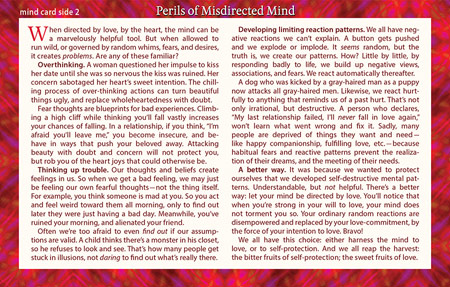Perils of Misdirected Mind
When directed by love, by the heart, the mind can be a marvelously helpful tool. But when allowed to run wild, or governed by random whims, fears, and desires, it creates problems. Are any of these familiar?
Overthinking. A woman questioned her impulse to kiss her date until she was so nervous the kiss was ruined. Her concern sabotaged her heart’s sweet intention. The chilling process of over-thinking actions can turn beautiful things ugly, and replace wholeheartedness with doubt.
Fear thoughts are blueprints for bad experiences. Climbing a high cliff while thinking you’ll fall vastly increases your chances of falling. In a relationship, if you think, “I’m afraid you’ll leave me,” you become insecure, and behave in ways that push your beloved away. Attacking beauty with doubt and concern will not protect you, but rob you of the heart joys that could otherwise be.
Thinking up trouble. Our thoughts and beliefs create feelings in us. So when we get a bad feeling, we may just be feeling our own fearful thoughts—not the thing itself. For example, you think someone is mad at you. So you act and feel weird toward them all morning, only to find out later they were just having a bad day. Meanwhile, you’ve ruined your morning, and alienated your friend.
Often we’re too afraid to even find out if our assumptions are valid. A child thinks there’s a monster in his closet, so he refuses to look and see. That’s how many people get stuck in illusions, not daring to find out what’s really there.
Developing limiting reaction patterns. We all have negative reactions we can’t explain. A button gets pushed and we explode or implode. It seems random, but the truth is, we create our patterns. How? Little by little, by responding badly to life, we build up negative views, associations, and fears. We react automatically thereafter.
A dog who was kicked by a gray-haired man as a puppy now attacks all gray-haired men. Likewise, we react hurtfully to anything that reminds us of a past hurt. That’s not only irrational, but destructive. A person who declares, “My last relationship failed, I’ll never fall in love again,” won’t learn what went wrong and fix it. Sadly, many people are deprived of things they want and need—like happy companionship, fulfilling love, etc.—because habitual fears and reactive patterns prevent the realization of their dreams, and the meeting of their needs.
A better way. It was because we wanted to protect ourselves that we developed self-destructive mental patterns. Understandable, but not helpful. There’s a better way: let your mind be directed by love. You’ll notice that when you’re strong in your will to love, your mind does not torment you so. Your ordinary random reactions are disempowered and replaced by your love-commitment, by the force of your intention to love. Bravo!
We all have this choice: either harness the mind to love, or to self-protection. And we all reap the harvest: the bitter fruits of self-protection; the sweet fruits of love.

